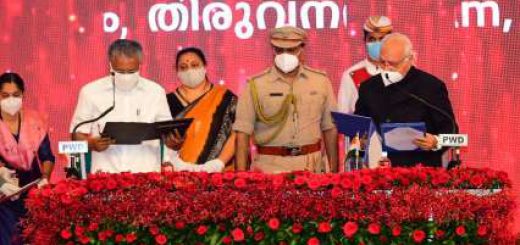Lakhvi, Lashkar’s untouchable terror commander
Lakhvi and HM chief Syed Salahuddin. (Source: AP file photo)
In the spring of 1999, as Pakistani special forces crossed the LoC to take up the positions they would hold through the Kargil war, the Lashkar-e-Toiba’s top military commander proclaimed the opening of a second front. “To set up mujahideen networks across India is our one target,” Zakiur Rehman Lakhvi told The Nation on April 9, 1999. “We are preparing the Muslims of India, and when they are ready, it will be the start of the disintegration of India”.
Lakhvi never achieved this dream, but on November 26, 2008, he alleged masterminded the most brutal terrorist attack India has ever seen. Indian investigators have submitted hours of audio of his conversations with the 26/11 assault team from the Lashkar’s control room in Karachi. The same audiotape is being used in the trial of Zabiuddin Ansari, the Maharashtra-born former SIMI activist alleged to have also helped at the control station.
In 2009, this evidence, as well as material gathered separately by Pakistan’s Federal Investigation Agency (FIA), led Pakistan’s former interior minister Rehman Malik to admit Lakhvi was the centrepiece of the 26/11 plot.
Related
However, the evidence has proved useless, as Lakhvi has refused to provide voice samples to investigators — a position that courts in Pakistan have upheld. Thus, there is no proof before the judges that the voice is his.
Ever since he was arrested on December 7, 2008, there has been mounting evidence that Lakhvi has enjoyed special privileges inside Rawalpindi’s maximum-security Adiala Jail. In a statement announcing sanctions against eight key Lashkar operatives on Thursday, the US Treasury Department said that top Lashkar operative Sajid Mir had been made “responsible for Lakhvi’s security as of 2010.”
Interestingly Mir, who was indicted as one of the top conspirators in the 26/11 case after he was named by LeT operative David Headley, is claimed to be a fugitive in Pakistan. Indian and western officials insist he lives in plain sight in Lahore.
The investigative online journal ProPublica reported that former Pakistan Army chief Ashfaq Parvez Kayani had declined to confiscate Lakhvi’s cellphone, allowing the Lashkar commander to coordinate the group’s operations from inside prison. The journal said Kayani “rejected a US request that authorities take away the cellphone Lakhvi was using…, according to the memo to Secretary of State Hillary Clinton and the National Security Council”.
In prison, Lakhvi met with Lashkar leaders, conferred with top Pakistani intelligence officials, and even fathered a son. Delhi-based Indian intelligence officials say Lashkar personnel stand outside the jail, screening visitors.
Born on December 30, 1960, Lakhvi, who is sometimes referred to by those he has trained as “uncle”, has long served as LeT’s overall military chief, and is a member of its powerful general council. He is alleged to have directed operations targeting Indian forces in J&K, and routed dozens of LeT operatives to Chechnya, Bosnia and Iraq. In a speech at the Lashkar’s headquarters at Muridke in 1999, Lakhvi claimed credit for several suicide attacks in Kashmir, and threatened to stage one in Delhi “to teach India a lesson”.
Sajid Mir, Lakhvi’s one-time secretary, was responsible for recruiting western nationals to the Lashkar — the most famous among them being Headley.
Source:: Indian Express








